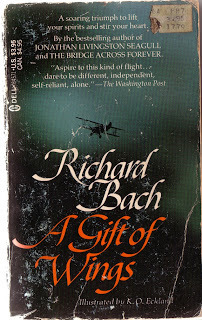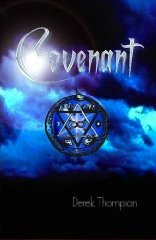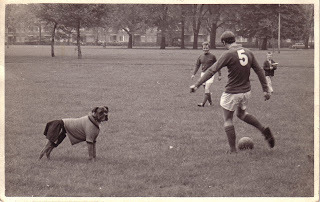Derek Thompson's Blog, page 25
September 8, 2012
Comfort reading

Ask any fervent reader and they'll tell you that they have a treasured few books they read over and over again. Know you're going to be stuck on a train or a coach? Want to fill a few minutes with the familiar delights of a well-loved tale? Or maybe you like to check in with a long-standing paper friend, just to see if you're still as close as you remember?
Books - like music, scents and photographs - have the power to magically reconnect us with the past. When you choose your reading matter with discernment, every book you read seeps into your DNA. Sometimes it's an author's entire works, rather than a single book, but the same principle applies.
Richard Bach's The Gift of Wings is one such book for me. Just holding the battered cover transports me 25+ years through time. I'm on the Staten Island ferry, heading for Manhattan, and wondering how to spin my disaster of an American Dream into a more positive adventure.
I can see my 1986 self now, a bagel in one hand and Gift of Wings in the other, breathing in the salt-sea air as I devour R Bach's collection of old articles, especially the ones that speak of limitless possibility and the freedom to shape my own destiny. I glance up, periodically, watching as Manhattan looms ever larger, and the water glistens like a molten, silvery sheet. And I whisper to the stern sky, "This is the moment I have chosen." Ah, bless.
I rarely read the pieces in order - I have my favourites there too. Over the years, those preferences change, and sometimes so does my attitude towards the book's contents. I guard against the internal 'tsk-tsk', where the jaded, cynical side of my nature swamps the bright-eyed optimist to mutter despondently, 'Yes, well, it's fine for you to think like that, but look at the life you've been able to lead.'
I know differently, of course. I only have to look at my own, meandering path to recognise that choices are made every day and consequences pop up around us like daisies. I started reading Richard Bach's books in 1983, long before Gift of Wings joined my travelling bag for $3.95 from some un-named bookstore (but probably Weiser's).
I know too that all writers write a version of themselves - a 'who I wish to be and be seen as'. But then, don't we all?
My comfort reading also includes:
Illusions - Richard BachJonathan Livingston Seagull - Richard BachWuthering Heights - Charlotte BronteJude the Obscure - Thomas HardySecrets of Dr Taverner - Dion Fortune.
So what's on your list?
Published on September 08, 2012 09:37
August 25, 2012
Nothing stays the same
 True colours.Who knew that green peppers and red peppers could be one and the same? Not me, that's who. Are they more ripe, more sweet, or do they just fancy a change of colour scheme?* Whatever the reason, they do it because it's in their nature to do it.
True colours.Who knew that green peppers and red peppers could be one and the same? Not me, that's who. Are they more ripe, more sweet, or do they just fancy a change of colour scheme?* Whatever the reason, they do it because it's in their nature to do it.Writing and publishing, like our peppers, is subject to growth and change. If I wanted to get poetic, I'd say it is an ever shifting landscape.
The independent book shops of old have been squeezed out by the chain-stores (although thankfully there are still a few around). The chain-stores in turn are now grappling** with Amazon and ebooks. And readers seem to want ebooks on every available platform, device and format.
It doesn't seem that long ago since I was at the London Book Fair, standing next to an Espresso Book Machine and discussing the economics with an author, an independent publisher and a shop proprietor. It was 2009, actually.
Now there seems to be so many ways for writers to get their work out there that you have to wonder what's stopping us. And there are no shortage of great websites and blogs out there to offer advice and guidance. But before every writer runs themselves ragged, in several directions at once, it might be wise to think about what sort of writer you are. And to revisit that question regularly.
Say what you like about Fifty Shades - and I haven't read it, so I can't say much - it has sold in droves and seems to unashamedly have hit its target audience. No, it's not Shakespeare, and yes, it has generated controversy about whether it empowers or demeans women. Most importantly, for any book, it is being read.
There is so much pressure on writers to focus on 'out there' that it's easy to disconnect from the joy of writing. Of starting with a blank page and the seed of an idea, then lovingly crafting that into a fully realised set of characters, situations and locations. That, my friends, is a little piece of magic, and it's an inner process. The only way isn't Essex, after all; it's in being the writer only you can be***.
And on that note, I'll be getting back to my esoteric fantasy, Covenant.
* Sweeter, it turns out.
** Some might say 'capitulating'.
*** I've yet to see a pepper worrying about the competition in its efforts to develop.
Published on August 25, 2012 04:09
August 16, 2012
The Chapel in the Woods
 Today I'm joined by Susan Louineau, who has completed and published her first novel, The Chapel in the Woods. I managed to bag some of her valuable time (see below) to find out about how she writes, why social media is her new friend, and the benefits of a soft pencil.
Today I'm joined by Susan Louineau, who has completed and published her first novel, The Chapel in the Woods. I managed to bag some of her valuable time (see below) to find out about how she writes, why social media is her new friend, and the benefits of a soft pencil. 1. As a new author, what do you wish you'd known at the beginning?
I wish I'd had the courage to put my work out there sooner. I've wanted to be an author for very many years but confidence held me back. Don't let anyone put you off, close your eyes and jump!
2. Tell us about your book.
The Chapel in the Woods is a mystery set over three time periods; 1172, 1942 and the modern day. It's main characters are all Britons who found themselves in the same village in the Loire Valley and their contribution changed the history of that village forever.
3. What made you decide to write over three different time periods?
I've always been fascinated with old buildings and the history they conceal. I stumbled upon a derelict chapel in the forest near my home in the Loire Valley and couldn't help wondering who may have passed through there and what their purpose was. I heard a rumour that it was believed that an English monk had hidden in these woods in the 12th century and that it had been named after him - though this has not been substantiated. I, of course, thought of Thomas Beckett and THE CHAPEL IN THE WOODS was conceived!
4. Why set your book in France and did that choice present any additional challenges?
I lived in France for seven years and am a confirmed Francophile. Having studied there, renovated a house, had children and cooked, eaten and made merry, I simply enjoyed writing it all down and celebrating their unique lifestyle.
5. How much research did you do about the ebook market and the various
publication and distribution options?
Absolutely none, it has been a steep learning curve. Since I published in March I have 'met' an amazing number of fellow indie authors on Twitter and between us we share, guide and support each other to success.
6. What are you working on at the moment?
I am currently working on a novel set in Cornwall 'The Weather Gods'. It is again set in a community with all the flavours and values of this amazing County and as the title would suggest intertwines science and mythology.
7. What is your writing process?
I try and write 1000 words a day. If I get stuck I draw up character profiles of their loves, fears, habits (good and bad) - most of which will never be included in the story but help to define what their next move might be, and it usually does the trick and I'm on my way again. I seem to work more productively in public places like on beaches or in cafés. I tend to veer between typing straight into my laptop, writing with a good fountain pen or a soft pencil depending how my mood takes me!
As a self-published author a large part of my day is spent marketing on Twitter and Facebook and controlling myself not to check my sales figures online every 2 minutes! I moonlight as a wife, mother and a translator as I like to keep my hand in in the real world so at times writing has to take a back seat. But variety is important in anyone's life and I wouldn't swap mine for anything!
The Chapel in the Woods is available through Amazon.
http://www.amazon.co.uk/The-Chapel-Woods-ebook/dp/B007JBG9HG
http://www.amazon.com/The-Chapel-Woods-ebook/dp/B007JBG9HG
Published on August 16, 2012 02:33
August 10, 2012
I know something you don't know*
 What does a maze represent?I'm sure we've all seen one particular piece of advice that's handed out to new, would-be and, indeed, seasoned writers: write about what you know. Which is all fine and dandy until I read about a succesful series starring a time-travelling vampire disc jockey (it really is the way I tell 'em), and then I start to wonder.
What does a maze represent?I'm sure we've all seen one particular piece of advice that's handed out to new, would-be and, indeed, seasoned writers: write about what you know. Which is all fine and dandy until I read about a succesful series starring a time-travelling vampire disc jockey (it really is the way I tell 'em), and then I start to wonder.I sometimes twist the advice around so that it reads: know what you're writing about. Which makes a lot more sense to me. Not that I'm in the habit of offering writing advice.
I do like models though (no, not that kind), and while I appreciate Alfred Korzybski's assertion that 'the map is not the territory', it can be bloody handy if you're trying to navigate through somewhere you've never been before.
On reflection, one useful model for good writing might be a combination of: a) Sufficient knowledge (information).b) The relevance of that knowledge to the reader (context).c) A fresh and compelling way of presenting the above (angle).
Although the requirements for fiction or non-fiction may be slightly different, I think those same building blocks still stack up. And when you look at it that way, anyone can do it.
[Insert a pause here for optimism or sarcasm, as the mood takes you.]
A quick glance through my CV (I've been reviewing it this week) shows pieces about interior design, electronic equipment, personal security, private education, staff motivation, intuitive symbolism, chickens, and downshifting, among others.
I guarantee that anyone who knows me even relatively well will find the idea of me writing about at least one of those subjects incongruous and amusing. Nevertheless I wrote what was required. Not because I'm as clever as I sometimes purport to be (I do impressions), but because I understood the brief and the rules of the game. My point is that we ought not to be put off by the idea from writing about a subject because we don't feel we have the expertise. Writing is as much about exploring possibilities and ideas as it is about putting words down on the page.
However, there really is something I know that you don't know. And it's about a fiction competition where I've taken 'silver', only I'm not allowed to mention it yet. The tension is killing me! More news when I'm allowed to blab.
* Although you can probably look it up on the Internet.
Published on August 10, 2012 04:41
August 4, 2012
Quid pro quote
 How d'ya like 'em?
How d'ya like 'em?I must post upwards of a dozen blog comments a month. Some months it's well above that, and I'm by no means not alone in that respect.
Usually it's for someone I follow regularly or occasionally I find something in cyberspace that captures my imagination. Often I choose to comment because it's a fellow author at Musa or a comrade on Strictly or someone else I have connections with (and for the preceding reasons), and who wouldn't want to support a buddy?
I used to feel a certain pressure with commenting and I have to say that I've long since noted a marked inequity between what I give and what I receive. However, that equation actually liberates me. If it's not a checks and balances arrangement then I'm free to comment when and how I feel like it, although I try to make it meaningful. After all, I want them to know I have read their piece and that I'm paying attention.
Blog posting is a strange and captivating world. It's the column you always dreamed of (minus the money or the guarantee of a readership, of course) or it's a confessional to the world. However, blogs do not write themselves. They take time and effort and focus. In short, they're like any other form of writing.
Commenting does two things:1. It lets the blogger know that their post has been read and understood. (Or, in the case of the person who wanted to sell me the services of a detective in Arizona, completely ignored but for the odd keyword.)2. It opens up the possibility of a dialogue. Writers love dialogues - and they needn't be solely about their own work and how wonderful it is, although that can be a great way to start the day/week/coffee break.
I like to ask questions too, partly because I'm a nosey sod and partly because I hope other commenters and readers will enjoy the answers.
So I may not comment on your blog all the time, but be sure that when I do it's because I want to, and not because I feel a sense of obligation (well, maybe occasionally!). And if I don't comment, it's only because I don't have anything to say.
If you have something to say, why not make a writer's day (and any blogger is a writer) and drop them a line. You never know where the conversation will take you.
Published on August 04, 2012 03:47
August 1, 2012
So that's what it was all about
 Paddle your own canoe or go with the flow?I'm about a third of the way through the final read through of my fantasy, Covenant, having gone through the traditional love / hate relationship that characterises doing my own editing. Commas have been sacrificed and, occasionally, reinstated; sentences rewritten to the level of my tolerance.
Paddle your own canoe or go with the flow?I'm about a third of the way through the final read through of my fantasy, Covenant, having gone through the traditional love / hate relationship that characterises doing my own editing. Commas have been sacrificed and, occasionally, reinstated; sentences rewritten to the level of my tolerance.You see, Covenant is an old book. And how I wrote then, hopefully, isn't how I write now. It has its own voice though and that's why I want to nurture through to the printed page.
What I'm most focused on is the ending.
It seems to me that the ending of a book has to serve a number of purposes:
1. To conclude the story. Or, if there are sequels to follow, to conclude that chunk of the story.
2. To tie up the loose ends you gave expectations of tying up.
3. To give the reader a sense of satisfaction because you have delivered the goods. The blurb did not lie. Thrills, spills, chills, and all manner of other rhyming words. (Grills?)
4. To whet the reader's appetite for all your other writing.
5. To say goodbye to the characters and give them a decent send-off.
6. Paradoxically, to make the reader think about the characters after they've closed the cover - in a good way. When I read a book that has touched me, I'll be thinking about the main characters for up to a week.
There are also those who say, "Leave 'em guessing. End with the sirens or the dragons arriving or the heroine holding a plane ticket that the reader can't see clearly."
Ending a book, for a writer, is also about saying goodbye to a segment of your life. Whether anyone reads your book or not (and cheers, Jem, for your last reading of Standpoint in case you're passing), whether it's published or not, I guarantee that every writer can be instantly transported back to that time if they were to read their work back again. Maybe that's why I've been told that few authors enjoy reading their own books.
I sincerely hope I've done the reader and my characters justice with Covenant. Like every author I know that once it's out there, a line is drawn and there's no going back. Frankly, I'm looking forward to it!
 Coming soon...
Coming soon...
Published on August 01, 2012 09:27
July 28, 2012
Going for...atomic number 79
 'On me 'ead, son.'Like an estimated 1 billion people worldwide (and mindful of apparent restrictions on words that can be used for the next few days), I watched the opening ceremony of the quadrennial 'global sporting event' with a mixture of high expectation, positivity and awe. Danny Boyle, Tracey Seaward and the entire team pulled off a truly magnificent spectacle that drew on the achievement and mythos of Great Britain to showcase a vision of where we've come from and who we are.
'On me 'ead, son.'Like an estimated 1 billion people worldwide (and mindful of apparent restrictions on words that can be used for the next few days), I watched the opening ceremony of the quadrennial 'global sporting event' with a mixture of high expectation, positivity and awe. Danny Boyle, Tracey Seaward and the entire team pulled off a truly magnificent spectacle that drew on the achievement and mythos of Great Britain to showcase a vision of where we've come from and who we are.Some will have loved it while some couldn't wait to take to Twitter with their outrage, cynicism and general thumb-nosery. Who is right? I guess that all depends on what you think the ceremony is about and how important it is for you to see your own perspective portrayed to the world.
As I watched the nations of the world parading around the stadium it made me think about how diverse we are as a species and how many flags I wouldn't have recognised. It also made me think about the practice writing.
How so? It started with the ideas of preparation, personal sacrifice, dedication and striving to achieve. But there's also another side to it that chimes with the spirit of Olympism (fret ye not, that one isn't on the list and I heard one of the BBC team say it yesterday so it's probably a real word).
Not every country will make it to the podium. Not every competitor will achieve greatness and recognition outside their own small circle. However, each competition represents the culmination of a whole range of factors that started with the intention to compete.
So much of writing now seems to be tied up with atomic number 79. Heaven fore fend that we should only aspire to 47 or 29. I've said it many times before now - we're not all going to the prom. We will not all get a three-book six-figure deal. Some of us may have to be satisfied with a three-book sales sheet. But the opening ceremony reminds us that we can compete on our own terms, by being the writers that we are and doing our best work (and editing and PR and all that other good stuff).
I salute those sportspeople and writers who manage to bring home glory and world recognition for their achievement. They have and will continue to inspire us. I also salute those sportspeople and writers who turn up to give of their best and show their talent to the world, even if the world at large never hears of them again. There is no shame in being outclassed by someone who is better than you. And nothing more honourable than daring to compete in the first place.
Published on July 28, 2012 07:05
July 23, 2012
Then there was music...
 Hello? Police? I want to report a crime against music...
Hello? Police? I want to report a crime against music...So, the story of the band...
I'm guessing most people start a band because they want to be cool or they want the chicks (or guys) or, best of all, because they idolise a band so much that they learn to play an instrument. I wanted a band so that I could hear what my songs sounded like outsideof my head for a change. For my two schoolfriends - let's call them Ringo and Paul, for the purposes of satire - it was a combination of cool and chicks.
First off, we needed a name. That was easy - Bad Timing. More than a band name, it summed up my angst-ridden adolescence at the time!
We had one song to rehearse, Coffin Nails, and I had a notebook of lyrics (many of which still survive) to follow. Somehow I found rehearsal rooms only a bus ride away. I still had my Casio VL-1 (I'd eventually graduate to a Yamaha CS-01 Micro Mono-synth - and by graduate, I mean that I'd buy one - not learn to play it properly).
On the big day we arrived at the railway arches, paid at the desk and went inside. It was like entering another world. The walls seemed to hum with the distant throbbing of other bands making music. The atmosphere reeked of sweat and ozone and leather jackets.
"Room six - door's open," the musico at the desk told us, pausing to sneer like a rock star. Either that or he had a naturally sneery face. Or he thought my Casio VL-1 wasn't harsh enough. Or all three.
Room six was an Aladdin's Cave, with instruments. As promised, there was a keyboard, microphones and a drumkit. Brilliant. I handed out lyrics sheets (they'd forgotten to bring copies, much as I'd anticipated) and attempted to explain how the song went. Which is no easy thing when you can't write music or play to any discernible degree.
There was but one rule: no swearing. I intended to record the session. The plan was to nail Coffin Nails, if you see what I mean, and then go through my notebook to see which songs worked for us. I could also tweak the lyrics if need be. I hoped it would transform my writing ability.
We set up and our vocalist (John, remember?) approached the mic. He tried testing one, two, three, blushed scarlet and then declared sheepishly that he couldn't sing. Not because of a lack of talent - we never got that far to form an opinion. He meant that he was too self-conscious to sing. Not a brilliant trait in a lead vocalist and something I'd have thought he would have encountered before.
So, singer and drummer swapped places - John on drums and Ringo now on lead vocals. Which actually wasn't that bad because the drummer couldn't really play either. And, let's not forget, my rudimentary keyboard skills were unlikely to give Richard Clayderman or Jeff Lynne a run for their money.
And so we began. After an hour of hammering Coffin Nails to death, pardon the pun, we took a break. Machine coffee and chocolate bars in hand, we checked out the grafitti strewn across every inch of wall and ceiling, and John added our name. A 'real' band next door, who sounded like a punk version of Pink Floyd (Punk Floyd?) reignited our enthusiasm.
"Let's do this!" someone might have said.
I returned to the large keyboard in situ - the one with a few dead keys, and struck up what had become the opening chords.
"Okay guys, one run through and then we'll get a perfect take. And then we'll move on."
We were mid song and I was thinking about how great this all was, and wondering why the rooms were so affordable, when a train passed overhead. I say overhead, but it sounded like it was about to come through the walls. It was an immersive locomotive experience. I think the lights dimmed too. Rock and rolling stock, as you might say.
Back to the grind. There was too much laughing and joking around, so we took a quick break. I came back from the loo to find our vocalist-turned-drummer lighting up a joint - for his nerves - and slumping in the corner. Clearly, he'd started the rock and roll life early.
As if to balance the mood, I started ranting. If someone is mellow there is no point ranting, but that wasn't going to stop me.
Somehow we made it through to the end of a three-hour session, with our friendship and my aspirations intact. We had one song on tape. The same song. Over and over in a variety of hideous takes. It turned out that making music was harder than I thought.
I still had hope though. Along with a clutch of other songs that I was determined to get on tape come hell or high water. We made plans to return in a couple of weeks, and retured to the pub. Where our drummer turned vocalist (Ringo, not John) reclaimed his drumsticks and posed them out of his back pocket at the bar, in case any passing groupie was looking for a musician to worship.
I made copies of the tape for each of them and gave them another copy of the lyric sheet to learn. Three weeks on, when no one had bothered (yes, of course I tested them - I was and am that fixated), I gave them an ultimatum. Which of course they ignored. And thus ended Bad Timing.
There was an aftermath, of sorts. We were offered a gig at a pub in Hackney, but that's another story. And I went on to write more lyrics - some of them passable and some merely dire. I sent material off to Safari Records, for Toyah Wilcox to consider, and they sent it back. I joined the International Songwriters Association and bought tapes of drum tracks. I bought a Yamaha CS-01, like I said, and I once (literally, once) rehearsed with a real musician playing background keyboards for him to tweak his own songs. In a sense it was a teeny tiny rock & roll story of a dream that, unnurtured, died. But it was never forgotten. I'm pleased to say that the music world struggled on without me.
Bang Bang Bang BangAnother nail in your coffin. Bang Bang Bang Bang Not long to go. Bang Bang Bang BangGone too far for stoppingBut just remember,It's the way you chose.
Published on July 23, 2012 01:01
July 20, 2012
We Need to Talk
 Sometimes things just don't add up.I posted recently about the ways, in my experience, that freelancers can add value. It prompted a few responses and a lively dialogue with professional copywriter Alasdair Murray.
Sometimes things just don't add up.I posted recently about the ways, in my experience, that freelancers can add value. It prompted a few responses and a lively dialogue with professional copywriter Alasdair Murray.For the record, let me state that:
1. I enjoy being challenged, where it makes me think about what I'm communicating - and why.
2. It's not about getting consensus, it's about developing and presenting a reasoned argument with evidence and supporting information.
3. Alasdair has a point.
You can read the post and comments here, or I can sum it up in a few lines. Okay, I said one way of securing regular work was signing up with sites that advertise writing work. I mentioned that I'd signed up with Copify, enjoyed their blog and that the signs were good so far. (That's all true. I wrote one piece for £12 and it took less than an hour, although I didn't state that in the piece.) Alasdair countered that the site offered work for 2p per word, which is low when compared with the professional rate and undermines the profession.
The dialogue throws up some interesting questions:
- What distinguishes a professional from a beginner or an intermediate practitioner?
- If the rate you want / deserve is not available, what do you do?
- How long ought one to write at a lower rate in order to build a portfolio?
- What if it were a magazine offering a lower rate or a publisher slashing a royalty percentage?
In short: When does a professional become a professional?
And what about the pic 'n' mix writers like me? How much experience is enough experience?
After the discussion, I went back to Copify to ask about their average rate per word.
Hi Derek,
I can tell you that over the past 30 days, the average per word rate we have paid out to writers has been 2.9p, the average pay in total for a job is £12.
If you need any further information, please don't hesitate to contact me!
-
Martin
Now, in the interests of balance, it must be said there are jobs posted there that could equate to £6 per hour. Would I write for that amount? No. In fact, the last writing gig I really fancied doing was advertising that rate, for an hour's work, and I bumped them up to £16 on the basis of my background, experience and promised turnaround. I got the job.
It's a conundrum. When I had a piece commissioned by and published in The Guardian, I expected it would open doors and lead to further newspaper work. Thus far, that hasn't been the case - although I have written for several magazines (different rates and regular work). So what's a writer to do if the work stream dries up, as it can do from time to time? Do we hold the line and say that if no one is paying the rate we'll go and shell peas instead for a bit?
Come to that, should we, for the good of the profession, maintain standards even when they have a potentially detrimental impact upon us? Alasdair's point, in part, was that not everyone has the skill and talent to be a copywriter.
That's true.
Writing - of any kind - takes practice and discipline to develop. If there are more writers than highly paid work, what's the solution? Is undercutting the industry rate akin to strike breaking? Is it any different from a plumber (yeah, I know - writers and plumbers...) competing on price to the detriment of those who can't afford to work that cheaply? Isn't that the reason the UK manufacturing base has diminished?
(Tangentially, on the subject of loss leaders, look at the milk industry at the moment.)
Some would argue that businesses seeking a low rate per word have already decided that they can't or won't pay the industry rate. So one way or another a writer was never going to get, say, 10p per word from them.
I encourage you to share your views in the comments field. I think Social media can be more than just an opportunity to say I wuv you or Buy my book you bastards or even Social media is the work of Satan. It can be a platform for dialogue and meaningful conversation. It can be a tool for education and change. It can even be a way of challenging ourselves.
Bottom line. I was happy to take on a quick writing gig for £12. Should I have? And would you?
The floor is yours!
Addendum: Copify advises that its highest rate is 4p per word. I also asked for their views about its rate versus a higher industry rate and I will add a response here when I get it.
Published on July 20, 2012 05:49
July 15, 2012
Going for a song
 Henri could rock out with the best of them,
Henri could rock out with the best of them, but first the month end accounts were waiting.Have you ever had the experience of thinking about someone and then they phone you? Or maybe you've been thinking about a type of dog and suddenly one comes walking around the corner towards you? The psychoanalyst Carl Jung labelled such experiences synchronicities and there are people who point to these coincidences as indicative of a 'world behind the world'. More sceptical observers are quick to point out that we have an incredible capacity for filtering and selective memory, thus we remember the one percentage because it stands out from the commonplace and read into it a significance that, in a wider context, we may see differently.
Funnily enough, that wasn't what I came to talk about about at all today. Well, there was one synchronicity / coincidence - call it what you will. I was in the garden, singing. And if your imagined ears are already offended, it gets worse - the song was one of mine. Yes, back in the day, I fancied myself as a lyricist.
I'm not entirely sure how we got there, but Wolf and I were chatting on the phone recently and the subject of poetry and lyrics came up. Before you can whisper, "Oh good grief, no," I'd dug out my old lyrics book from the shelf and delved within.
I mentioned to Wolf, in passing, that I'd once written a song called Coffin Nails (jolly, n'est pas?), back when two friends and I had decided to start a band. One of us - let's call him Vince - had started a job as an apprentice at a funeral director's. It was a short-lived job (yeah, I know), in the end, but it provided the inspiration for the first of several songs that we daydreamed releasing as an album entitled 'Live at the Golden Egg' - a cafe in Stratford, back in the day.
Anyway, I found a Word version of the lyrics and sent them to Wolf and said I also have a rehearsal recording of said track. I should point out at this point that we were absolutely crap. So bad that the whole misadventure merits a blog post of its own. I'll simply say here that there was only ever one rehearsal - for one song - and the band, named Bad Timing by me, disappeared from the annals of entertainment thereafter. Which, trust me, was a kindness to all of you.
What was interesting though was seeing the dates next to some of my lyrics. Noting the flurry of creativity every few days, or trying to remember what I was doing with my life at that time. Even more interestingly, for me, are the missing pages.
Anyway, Wolf is pestering me for the cassette and I just can;t seem to lay my hands on it. Funny that!
One of the many things that continues to inspire me about writing is that there are no small stories, not if they're well told. In the same way that a trip to the shops is a huge adventure to a young child, when something captures the imagination it captivates our interest. We are compelled to make the journey, whether it's a remembrance or an invention.
Published on July 15, 2012 08:35



